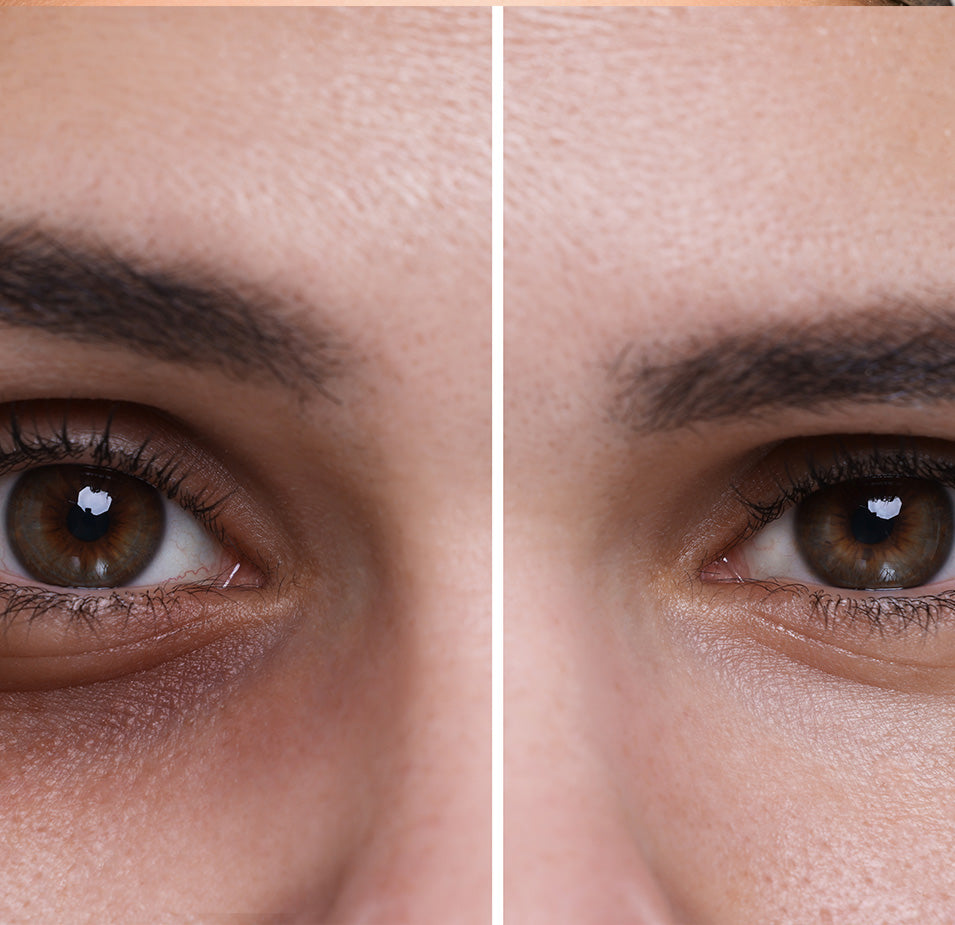
Cold, blustery weather is not your skin’s best friend. Maybe you’ve noticed that your skin chaps instantly when you’re just trying to get the mail on a snowy day—or that your skin texture starts to resemble cardboard if you’re not practically swimming in moisturizer all winter long. It’s true: science shows that seasonal changes can wage terror on the look and feel of your skin. The good news? A simple, effective winter skin care routine can preserve soft, supple skin in cold weather (and year-round).
What happens to your skin in cold weather?
As the days grow shorter, the trees lose their leaves, and the air becomes chilly, your skin changes too. You might notice:
- Your moisturizer doesn’t seem to accomplish as much as it used to
- Your skin is constantly dry, especially after bathing or showering
- Itchy, stinging, or otherwise uncomfortable sensations
- Skin tightness and lack of elasticity
- Redness and inflammation
The skin is like a magic sponge. It has a remarkable ability to retain moisture and preserve water content naturally. However, skin loses water more easily in extreme environmental conditions (especially in the absence of a healthy diet and skin care routine).
It may seem counterintuitive if you’re hiding from rain, sleet, and snow, but winter happens to be the driest season in most parts of the world. Moisture loss is most prevalent in cold weather, so keeping the skin well-hydrated is the secret to winter skincare.
Why does skin get dehydrated in the winter?
The human body strives to maintain a regular temperature in spite of changing climate conditions. A vast network of minuscule blood vessels in the skin works overtime to help dissipate heat in hot weather, increasing circulation ten-fold. Conversely, blood circulation drops dramatically in cold weather to conserve energy and warmth.
If the outside temperature is cold, your body tries its best to retain as much heat as possible by narrowing the blood vessels. This drop in pressure causes the skin to relax, making it easier for water to escape.
Without the right level of moisture content, the skin falls victim to:
- Dryness
- Irritation
- Flakiness
- Chaffing and friction rubs
- Itchiness, discomfort, or pain
- In extreme cases, windburns and bleeding
This natural response to cold weather makes it necessary to give our skin some extra love with targeted winter season skin care.
What are the other health consequences of cold weather?
Our skin health is interconnected with all our bodily systems and processes. It’s essential to look at the effects of seasonal changes holistically so we can treat our skin from the inside out.
Besides causing a shift in the temperature, seasonal changes also affect the position of the sun in relation to the earth. This means that we are exposed to different levels of sun rays at different times of the year. You can feel it yourself when you walk outside on a summer day: the sun almost blankets the earth in a warm embrace. And in the winter, it’s often nowhere to be found.
While strong sun exposure can be damaging, weak sunlight can interfere with vitamin D levels. Depending on where you live, supplementing may be helpful in the winter months to make up for the lack of solar-synthesized vitamin D.
Colder temperatures can also interfere with blood pressure, leading to an increased risk of heart attack among at-risk populations. If blood pressure is a concern for you, check with your doctor to make sure you’re staying safe.
How to adapt your skin care during the winter season
Exposed areas of skin are the most at risk of cold weather irritation (think forearms, neck, and face). The skin on your face is especially sensitive because it has a more delicate barrier and is always exposed to the environment. Here’s how to keep the skin fresh and hydrated, even when it’s out in the elements.
Dress Accordingly
Studies show that water loss is much higher in exposed parts of the skin. Without warm, protective clothing, hydration levels drop. Covering up as much as possible will help keep you comfortable and prevent moisture loss. So if you’re heading out for some cool-weather pickleball or taking your dog on a winter walk in the park, leggings, jackets, scarves, and hats are a must.
Moisturize
Moisturizing is always important, but it’s never more crucial than it is in cold weather. Applying moisturizer not only enhances cosmetic appearance, but also heals inflammation, delays the onset of aging, and improves the comfort and feel of the skin. Regular use of a pure, effective moisturizer has lasting positive effects.
Suppose you have a chronic inflammatory skin condition like psoriasis. In this case, you may consider using a thick moisturizing cream or ointment leading up to and throughout the winter season to avoid exacerbating your symptoms.
Experts recommend adopting a custom skin care regimen that is designed just for you based on your age, skin type, existing skin conditions, ethnicity, and lifestyle. Pick up your perfect moisturizer and keep it close.
Avoid Hot Baths and Showers
We all love luxuriating in a hot, steamy bath, but dermatologists caution against using excessively hot water—especially in the wintertime. That’s because hot water draws natural oils away from your skin. We need these oils to keep moisture locked in, so stick to moderately warm baths and showers instead.
Speak to an Expert
If you have sensitive, inflammation-prone skin or experience drastic skin changes in the wintertime, it’s always a good idea to consult a dermatologist. Qualified experts can help you learn more about available treatment options, as well as lifestyle modifications that may help prevent flare-ups.
Who is affected most by the cold weather?
Cold weather does not impact everyone equally. Factors like where you reside, your lifestyle, your skin type, and your age can make you more vulnerable to the effects of cold weather on skin health.
Be sure to take heed of the winter skin care advice above to nourish and protect your skin if any of the below applies to you.
- People who spend a lot of time outdoors in the winter season
- People who live in areas with humidity levels under 30%
- People over the age of 50
- People who live at high altitudes or in areas with extreme temperatures
- People who are malnourished or not getting adequate dietary vitamins and minerals
- Those suffering from genetic conditions like kidney disfunction
What happens if you don’t adopt a healthy skin care regimen during cold weather?
Other than skin irritation and physical discomfort, you can develop a variety of complications if you don’t keep up with your skin care regimen in the winter. For example:
- Certain skin conditions can worsen in the winter season if no skin care regimen is followed. These include eczema, dermatitis, psoriasis, senile xerosis, and rosacea.
- Research suggests that people who have dry skin have a much higher risk of developing premature signs of aging, including wrinkles and creases.
- Individuals who are exposed to severe cold temperatures without protective gear can develop a variety of cold-related skin lesions and ailments. Extra measures should be taken to protect the skin in such cases.
Take this as your sign to make self-care a priority. We all deserve a little extra “me-time.”
Should you use sunscreen during the winter season?
You may not need a lot of sun protection if you stay mostly indoors during the winter season. However, if you are a nature-loving, active, outdoorsy person, make sure you use SPF 30 sunscreen year-round to protect your skin from harmful UV radiation.
Sun protection becomes even more important if you live at a high altitude, where the sun reflects off snow and causes even more harm to dry, irritated skin. So while sunscreen may not be the first thing that comes to mind when packing for a ski trip, it should definitely be on the list of essentials.
Conclusion
Harsh winter weather is among the most common causes of unhappy skin. Poor hydration aggravates all kinds of skin ailments. But that doesn’t mean you can’t have balanced, healthy skin no matter the time of year. You just need to pay attention to seasonal changes and the effects that climate has on your skin. Remember that your skin care routine should always adapt to the season at hand, and you’ll be on your way to soft, supple skin in no time.
References
- Kikuchi, K., Kobayashi, H., Hirao, T., Ito, A., Takahashi, H., & Tagami, H. (2003). Improvement of mild inflammatory changes of the facial skin induced by winter environment with daily applications of a moisturizing cream. Dermatology, 207(3), 269-275.
- Xiong, J., Lian, Z., & Zhang, H. (2017). Physiological response to typical temperature step-changes in winter of China. Energy and Buildings, 138, 687-694.
- Kikuchi, K., Kobayashi, H., Le Fur, I., Tschachler, E., & Tagami, H. (2002). The winter season affects more severely the facial skin than the forearm skin: comparative biophysical studies conducted in the same Japanese females in later summer and winter. Exogenous Dermatology, 1(1), 32-38.
- Webb, A. R., Kline, L., & Holick, M. F. (1988). Influence of season and latitude on the cutaneous synthesis of vitamin D3: exposure to winter sunlight in Boston and Edmonton will not promote vitamin D3 synthesis in human skin. The journal of clinical endocrinology & metabolism, 67(2), 373-378.
- Qiu, H., Long, X., Ye, J. C., Hou, J., Senee, J., Laurent, A., ... & Piot, B. (2011). Influence of season on some skin properties: winter vs. summer, as experienced by 354 Shanghaiese women of various ages. International journal of cosmetic science, 33(4), 377.
- Macdonald, H. M., Mavroeidi, A., Aucott, L. A., Diffey, B. L., Fraser, W. D., Ormerod, A. D., & Reid, D. M. (2011). Skin color change in Caucasian postmenopausal women predicts summer-winter change in 25-hydroxyvitamin D: findings from the ANSAViD cohort study. The Journal of Clinical Endocrinology & Metabolism, 96(6), 1677-1686.

















